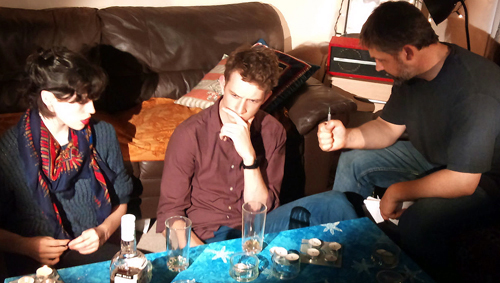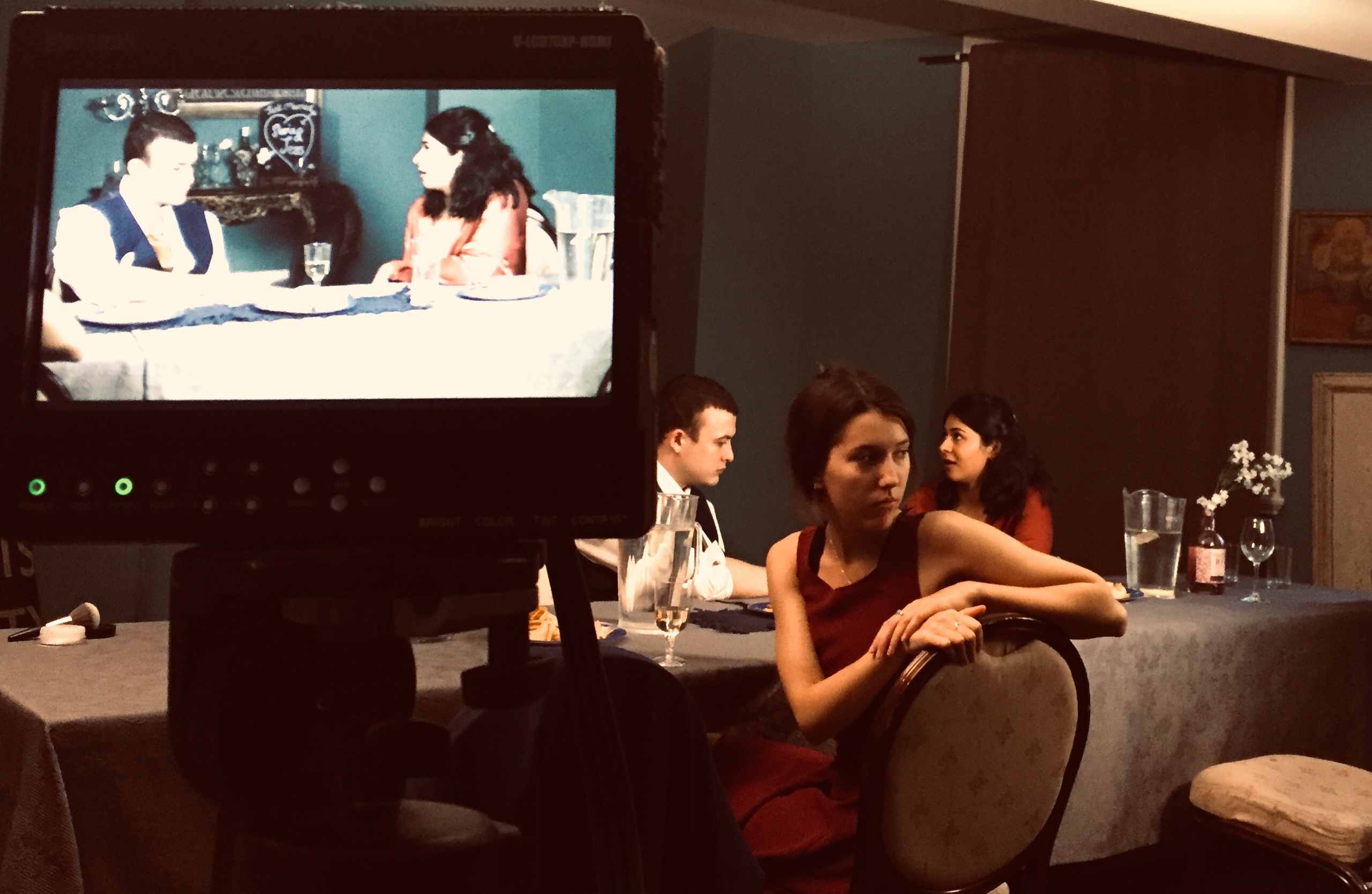Is Drama School the Only Path?
If you find yourself at home and believe that drama school is your only option for acting training, reconsider. By exploring online articles, videos, and books, you can create a personalized training regimen. As David Mamet notes in his book True and False, “It is more frightening, but it is not less productive to go your own way.” So what are some of the skills acquired through drama school training? If we can identify these elements, we can start to design our own schedule.
Where to begin.
One of the main things that you tackle when studying acting at drama school is how to bypass habitual responses or at least feel where those pre-sets are. When performing or devising you must be able to respond to a range of feelings in response to a myriad of stimuli outside of your world of experience and these feelings “must be able to find free release in action” (Marshal L, 2008:07). This also must happen in front of a room full of strangers be they the audience or a film crew. In short, you must allow parts of yourself you would normally keep hidden to be expressed/communicated to a bunch of total strangers. That is a big ask, but one you sign up for when you start your training.
There are numerous reasons why we filter our everyday reactions and responses, but let’s save that discussion for another article (check out some works by Keith Johnstone). For now, it’s important to note that we are shaped by our surroundings and become products of our environment. I recently came across a study discussing how first-year university students undergo an “adaptation process” (Morozov et al., 2017) when they enter college. Each student must adjust and evolve to fit in with their peers. Various factors contribute to this dynamic, leading us to argue that conformity can be limiting; after all, whose rules and structures are we adhering to? This tendency starts early in life as we grow up and learn to “behave appropriately” (Marshal L, 2008:3).
It’s crucial to understand that the true you is already within you. Your identity and all your attributes have brought you to this point, and that person will continue to face challenges and adapt as needed. Without delving too deeply into self-help territory, it’s important to appreciate what makes you unique, as this can lead to opportunities in the industry. However, we also want to expand our range, examine our instinctive reactions, and become aware of how our bodies respond and communicate with us. This awareness will help us “avoid the automatic and habitual management of impulse” (Marshal L, 2008:33) when performing on stage or screen.
When you start your training, you are introduced to a range of exercises that challenge these patterns of behaviour. Lorna Marshal’s book that I have already quoted entitled “The Body Speaks” is a good one for helping the actor reacquaint themselves with their whole body. I say reacquaint because, as she points out, not only were we once fully connected to our feelings when we were children but before urbanisation, our bodies were the conduit between our environment and our brain/mind. Our body with its five limbs – two arms/hands, two legs/feet and a neck/head – hasn’t been designed this way by accident; it came from a need to walk, climb, run, jump, crawl, hunt, feed and procreate. So early in the book, there are exercises like “Waking up The Legs” and “Star Fish” that re-engage the whole body.
Again, it is important to stress that you should approach this and all work that explores your body with a “gentle curiosity” (Marshal L, 2008:21). You are looking to extend your range. This work is personal to you. Not everyone can do every exercise, but we can adapt depending on our range of movement or explore different exercises and different ways of moving around the space, working seated or lying down: in short, there isn’t a right or wrong way of doing this work, just your way.
The next big thing that Lorna covers is connecting our minds to our bodies. We start to become aware of the responses to our environment, to the space and to recognise how our mind communicates with our body. We tend to live on autopilot and only listen to our body when it calls out in pain. As actors, we need to start recognising the subtle shifts. Two examples:
- When you go into a bar or café with someone do you opt for the seat facing the door if you have the choice? Many would say that they do. What makes you do this? What is the sensation and where does that feeling reside – in your belly, legs, or arms…? Without recognising it you are responding to the environment, and you make a choice, so there is a line of communication between our inner world (Marshal, 2008:36) and outer.
- Sometimes, the circle of communication between the mind and body is unmistakable. Standing near the edge of a big drop, your body will not “let you go too near. If you want to peer over the edge, you must forcibly override the body’s instinctive response. You can feel the battle between your will and your body” (Marshal, 2008: 44)
In a book by Stephen Wangh called The Acrobat of The Heart, he asks his students to find a “Safe Space” to work in. They try out different areas of the studio comparing how they feel in each. You can do this at home. You might only have your bedroom to work in during the winter months, but you can still explore different areas to find the best position – facing the window, the door, moving furniture and trying some moves – essentially what you are doing is connecting your “conscious and unconscious responses” (Wangh S, 2000) and waking up to those subtle shifts in your body. Start using your everyday routines to help you reconnect. Take time out of your day, for example, to sit in a space, either a café, a park, a bar, or your kitchen and listen to your environment using all the senses. I read a book on Mindfulness when a colleague at work pointed out that some of my techniques (I was teaching screen acting at this point) reminded him of Mindfulness techniques he had studied. He recommended Michael Chaskalson’s “Mindfulness in Eight Weeks,” and I could see the similarities when he discusses body awareness and “automatic-pilot routines” that plague us when we try to focus in on a moment. Being present is essential as an actor, so this is a good place to start and one that will support all of your work as a performer/creative.
So, if you are starting on your journey to be a creative/storyteller, then start by:
Remember to start from your own uniqueness as a performer/storyteller all you are doing is building on this to increase your sensitivity to the space and your ability to freely express.
- Reading a book on acting – I have mentioned five in this article
- Do some basic exercises at home (that you get from a book or online) that encourage you to explore your physical range and reconnect your conscious processing part of the brain with that elusive unconscious.
- You might do Capoeira, Wing Chun or basic stretches you use for a sporting activity, all of which are fine. While you do any of the above, try tuning in to what you are thinking/feeling as you commit to these moves. (Look to the exercise “Stream of Subconscious” in Stephen Wangh’s book on Acrobate of the Heart)
- Sit for five minutes a day and take in your surroundings
- Do a simple everyday routine and try to focus on the activity. If your mind wanders, you start to daydream or worry about the unpaid bill, then bring your focus back to the taste of the toothpaste or the sound of the toast being buttered or the sensations accompanying whatever activity you have chosen
- Remember, movement work is pleasurable. Nothing should hurt if you are listening to your body. Work within your range. Adapt the exercises and environment to suit you. You can work just as well sitting down as standing up or lying down if you need to. The main thing is to move, listen and engage.
You are an actor when you say “I am an actor”
This is the start of a lifelong journey. You are a performer the moment you say you are. It is great because this work not only develops you as a performer/storyteller but helps you grow and develop as a person. I remember what writer/actor and director, Fatima Dike once said to me “we learn through the work we do” and that is so true.

